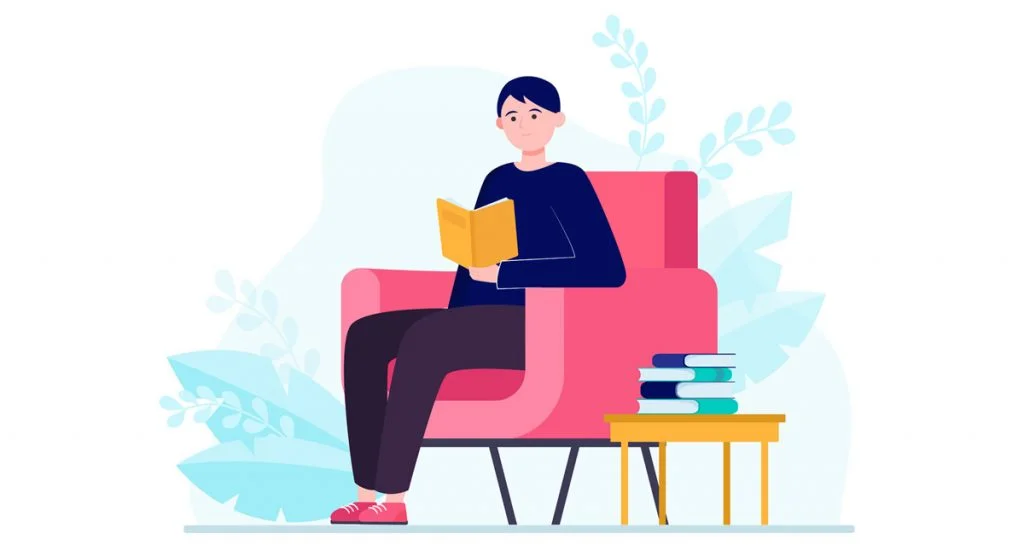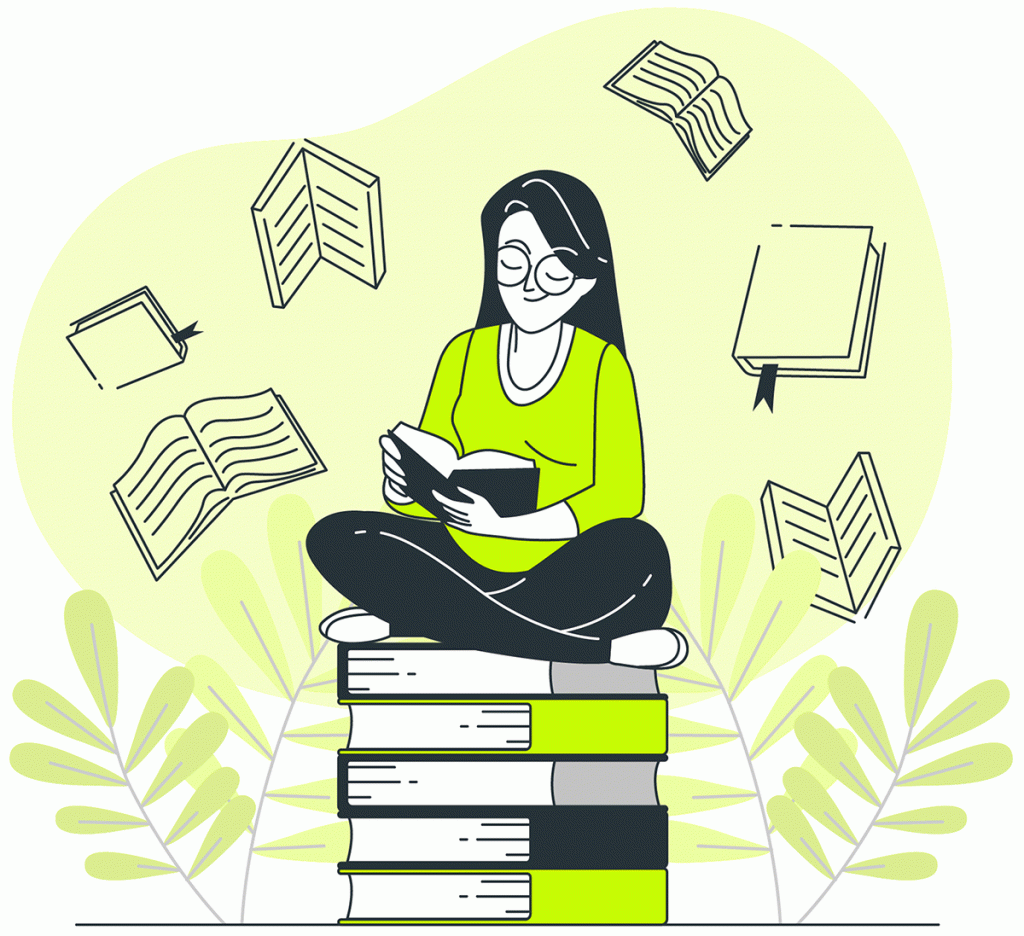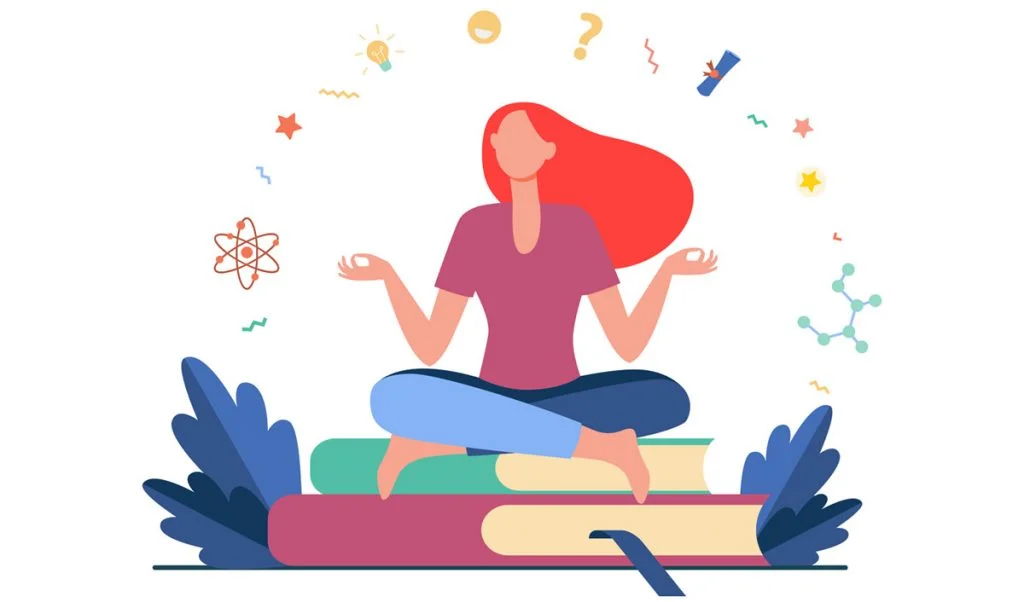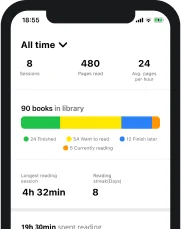How to become a better reader is a question usually asked by many in order to achieve their reading goals. Everyone wants to read more and unsurprisingly, to get more from their reading experience.
On top of being a very relaxing activity, reading can have a ton of health and intellectual benefits. We all know it enriches our minds, helps us achieve more in many aspects of our lives and plays a critical role in our development.
Whether you want to become a better reader just so you can improve your reading rhythm and experience or you need to start having better reading habits and efficiency for school, you will probably find all your answers here.
What are the qualities of a good reader?
If you’re wondering how to be a good reader, it’s important to know what a good reader is and does. So what does it really mean to be a good reader? Well, it’s an apparently simple question, but with a rather complex answer. Despite what some might think, being a good reader is not only someone who reads a lot and fast.
A good reader is actually the sum of a number of specific characteristics. Reading speed, level of comprehension, depth of understanding of the written text, all contribute to making a good reader.
Let’s have a look at some of the most important qualities of a good reader as part of answering your question “how to be a better reader?”
1. Reads constantly
Someone who is considered a good reader takes reading seriously. That means they will read constantly, will always be in the middle of a book or continuously looking for the next one.
Having a daily reading routine is an important characteristic of a good reader. By being always involved in this activity, they can maintain a good rhythm and they will gain a better understanding of the benefits of reading.
2. Understands the hidden meanings of the written material
Reading in itself is very important, but comprehension plays a huge role in the benefits of the experience. A good reader is someone who not only reads more quantity- or time-wise than the average person, it is also someone who can better understand the written text.
What I’m referring to here is not only the simple understanding or decoding of the written language but also a more in-depth comprehension of the text. Understanding and enjoying metaphors or other subtle subtexts while reading a book makes a huge difference in enjoying the experience of reading.
A good read will catch on to these things and will have a better understanding of the mental process the author has gone through while writing the book.
3. Remembers the material
What we’re left with after reading a book is different from one person to another. And it makes perfect sense, our brains function differently, we pay attention to different aspects of the text.
Another thing that defines a good reader is the amount of information they remember from the material they go through. Whether it’s basic information about the action taking place in the book, character names, or even more specific details like the timeline of the action, a good reader will remember more than the average person after finishing a book.
As I mentioned above, a good reader will catch on to a lot more details than the average reader. Not only that, but she will also remember a lot of that subtext, writing style and metaphors from a book.
4. Can apply lessons learned from books
On top of being a great pass-time activity and a healthy habit, people also learn a lot through reading. And I am not referring just to the basic information we get from books, I am also referring to life lessons.
Reading a book with an interesting storyline about some real or fictional character who goes through experiences we couldn’t have imagined can give us really powerful insights into the lives of others.
Whether the lesson is to always value each day spent with the people we love, or the power of resilience, pretty much all books teach us really important things.
What sets the good readers apart is their ability to identify, understand and later even apply the lessons they get from books to their own experiences.
Identifying similar situations and being able to make the connections and apply this knowledge gathered through reading is a sign of great intelligence.
5. Notices and appreciates good writing
Another big difference between an experienced, good reader and the average person is the level at which the former can understand and appreciate the author’s talent and writing style.
Nuances and the personal style of the writer are things that many readers don’t pick up on at first.
Having already read many books written by different authors, the good reader can easily identify and understand different writing styles and has a different appreciation for a well written text.
6. Metacognition — thinking about thinking
Metacognition is defined as a person’s ability to be aware of its own thought process. Sounds a bit complicated, but it really isn’t. This awareness of one’s thought process actually refers to a wide range of conscious mental abilities including:
- Planning how to approach a learning task
- Monitoring one’s comprehension of text
- Reflecting on the way of thinking of different people
- Knowing when to apply certain strategies and how to use already possessed knowledge
In the context of understanding what sets a good reader apart from an average one, the main thing we need to take into account when it comes to metacognition is the reader’s ability to think critically about their own comprehension of a text.
Through metacognition, a good reader will have a better idea about the level at which she is able to understand what she is reading. She will therefore know when she needs to re-read a certain part or do her own separate research about the topic, leading her to have a much better understanding of the novel she’s reading.
7. Visualize what they read
Being able to visualize the characters or the action in a novel plays a very important role in enjoying and understanding a book.
While it comes easy to certain people to see in their mind’s eye everything and imagine their own visual version of a book, others struggle to do so.
Luckily, this skill can be improved and the imagination can actually be trained. You guessed it right, it can be done through reading. Exposing yourself to a variety of scenarios, descriptions of characters and storytelling will increase your ability to visualize what you read.
An experienced reader will have a great ability of visualizing what she reads and the reasoning can go either way.
If visualizing is a natural ability she was born with, it could be part of the reason why she is a good reader. Being able to visualize what you read and play it in your mind like a movie can make reading a lot more enjoyable and can push you to read more.
The alternative would obviously be that her imagination is a result of her extensive reading through which she actually trained this skill, which means that being a better reader has helped her visualize better what she reads.
What is a poor reader?
Part of knowing how to become a good reader is knowing what a poor reader is.
While it would be easy to say that a poor reader is everything a good reader isn’t, things are actually a bit more complicated than that.
The concept of a poor reader usually refers to students who have a reading level (speed and comprehension) that is below the average of other students their same age.
When it comes to people above school level, being a poor reader mainly translates to having one or more of the characteristics below.
1. Unable to decode the writing and understand what they read
Being a poor reader could mean that a person has trouble understanding written text. This doesn’t mean that she is unable to read, just that getting the written message through is a bit more difficult for her than it is for other people.
Following the storyline or understanding references in a novel could be challenging, especially if the book is a tougher read.
Luckily, this can usually be easily fixed by reading a bit more. Slowly increasing the volume and the time spent reading can be highly beneficial for poor readers who struggle with having a hard time understanding the text as quickly as they are able to read it.
2. Bad fluency / slow reader
Being a slow reader and having bad fluency is also usually a sign of being a poor reader. Bad fluency basically means that the person will have a hard time maintaining a constant rhythm while reading and will usually mentally vocalize everything she reads.
Mentally vocalizing text is a common issue among readers and even though it’s not always an issue, it is known to slow down most people and decrease reading speed.
Practice makes perfect though. Bad fluency and slow reading speeds can easily be fixed through exercise. Actively making an effort to stop vocalizing and maintaining a daily reading routine can work wonders for people facing this issue.
3. Can’t distinguish between good writing and bad writing
Unlike good readers, poor readers will often miss out on subtle metaphors, won’t appreciate a well written text and will have a hard time identifying different writing styles.
Making a big enough effort reading, following the storyline and understanding the more literal parts of the writing, an inexperienced reader is unlikely to appreciate the quality of the text.
4. Skimming or reading too fast
Another common issue for the poor reader is being unable to pay attention or be patient enough to go through the text in-depth. Skimming or reading too fast will allow readers to go through novels quickly, but will often lead to them missing out of a huge amount of details.
Being in a hurry to finish a book and going through it too fast is rarely a good idea. Unlike good readers, poor ones won’t know when it’s time to slow down their reading in order to be able to keep up with the action or details.
Re-reading certain paragraphs for a better understanding of the text is sometimes essential, and through active practice and maintaining a certain awareness while leafing through novels, even poor readers will slowly understand the importance of a thorough read.
How to become a better reader?
Now that we have a better understanding of good and poor readers and the main differences between the two, let’s have a look at some of the best ways you can become a good reader.
Contrary to popular belief, simply forcing yourself to read more doesn’t necessarily make you a good reader. There’s a bit more to becoming a good reader. Actively trying to improve your speed, the volume and how organized you are will play a huge role in improving yourself.
So how to become a better reader? Here’s a couple of things you should keep in mind.
1. Don’t be afraid to stop reading a book you don’t like
We’re all somewhat trained to see it as a failure whenever we don’t finish reading a book. That’s because we’re used to mandatory reading lists from school, writing book reports and even being tested on the books we read.
Luckily, being an adult comes with the great advantage that we don’t really need to answer to anyone.
And sometimes, if you don’t like a book, it’s probably best if you just leave it. Forcing yourself to read something that doesn’t appeal to you is likely to do you no good. Learn when it’s time to let go and instead of wasting time, choose a different novel that you enjoy reading.
2. Set aside time to read books that are more demanding
Not all books are the same, and not all authors have the same style of writing. While some are relaxing and easy to read, others can be a bit more demanding.
From time to time, it’s a good idea to make an extra effort and read something you consider a tougher read. It will help you evolve, it will make you a better reader and it will give you a sense of accomplishment once you manage to finish it.
Also, more demanding books are usually more rewarding as well. Taking the time to read a difficult novel could turn out to be a great experience in itself and it can also benefit you in a number of ways, from the way it improves your reading to the life lessons you learn from its content.
3. Read actively / critically / don’t skim
Active or critical reading is the process of reading with a clear intention of understanding the content and evaluating its value and relevance to your needs.
Constantly engaging in active reading basically means you would always pay extra attention to the material you’re reading, trying not only to go through it, but also to understand it.
Being more involved in the process of reading will in turn make you a better reader.
4. Keep a dictionary close to you
Part of reading actively is understanding everything you read, meaning you should also pay close attention to new words you discover.
Instead of only understanding the meaning of the new words from context, we encourage you to look up these new words in a dictionary, whether you do it on your phone or the classic way.
This will help you enrich your vocabulary and you are a lot more likely to start using new words once you fully understand their meaning.
5. Always have books nearby
Pretty much a golden rule when it comes to reading, having a book next to you has the potential of helping a lot in your process of becoming a better reader.
You never know when you’ll be in the mood to leaf through a couple of pages or simply when you’ll have a couple of minutes for yourself.
Surrounding yourself with books that interest you will determine you to read more, which plays a massive role in aiding you to become a better reader.
6. Always have a reading list
A good read doesn’t only think about the book she’s reading, but also about the books she will read once the current one is finished.
You should always have an updated reading list you can strike through or add titles as time passes.
Having a reading list is important for your goal of becoming a better reader. It allows you to create and easily update reading lists, so that you always know what your next book should be.
With Basmo, creating your list only takes seconds and is done in just a couple of taps.
To get this done, you need to simply follow the steps below:
- Access the basmo app on your mobile device.
- Scroll down to Book Collections.
- Access the Want to Read list.
- Start adding titles to if from the + sign in the top right corner.
7. Read what you want, not what you think you should
As an addition to the idea of giving up on a book if you started reading it and you don’t like it, the same rule should apply to books you haven’t started yet but dread the thought of reading.
If a certain book doesn’t appeal to you, skip it regardless of online reviews or what other people think about it.
Read what you want and what you like. That way you will read more and you will enjoy the experience a lot more.
8. Create a nice reading environment
A good reader knows how important the environment is for a good reading experience. A cluttered desk is said to be a sign of a cluttered mind. And despite Albert Einstein’s epic comeback, I tend to agree.
When it comes to reading, letting go of the outside world is important. And you can’t really do that in a dirty room, with your children singing loudly in a corner or with the TV turned up.
Create your own reading space, surround yourself with a pleasant environment and disconnect from the outside world. Engage more actively in your reading instead and the benefits will come soon.
9. Plan your reading sessions
On top of having a nice environment for reading, equally important is to have your reading sessions planned. Having a schedule for your reading will help you take things to a different level.
While for many it would be enough to simply read as often as they can, for an avid reader who is looking to improve their skills, planning and scheduling are crucial.
Having a time of day reserved for reading and making this a habit will help tremendously.
If you think that’s a difficult thing to do, keep in mind that an app like Basmo can make things a lot easier for you.
Basmo allows you to set your own schedule, set reminders to never miss out on reading sessions and even set reading goals.
To set a daily goal for your reading sessions, following these steps is all you need to do:
- Open the Basmo app on your mobile device or tablet.
- Go to the Goals tab at the bottom of the screen.
- Tap on Adjust Goal.
- Select the number of minutes you want to read every day.
- Tap Done.
10. Join a book club or a reading challenge
Sometimes joining a book club or a reading challenge can help your growth as a reader tremendously. Being part of a community with a common goal will determine you to push your limits.
You will read more, you will probably go outside of your comfort zone when it comes to the books you will read and you will be guaranteed to gain a lot from the whole experience.
11. Have a reading journal / make notes
Writing down your thoughts can make the process of active or critical reading a lot more effective. You’re not only thinking about what you read, but you also put down your thoughts in writing, engaging a completely different part of the brain.
This makes the whole process more complex and the experience a lot more fulfilling, making you a better reader. And the best thing about it is that you can actually use an app like Basmo to make the activity smoother and easier.
To start your reading journal, simply follow these steps:
- Open the Basmo App
- Start a reading session by searching for the book you’re reading and tapping on Start Session
- While the reading session is ongoing, you can add your thoughts about the text by tapping directly on the screen
12. Use a reading app
As I was saying, using a reading app nowadays can have many benefits for you and can be the answer to many things, including your question “how to become a better reader?”.
Let’s take a quick look at the features that make Basmo a great reading app and a great tool for you
- It allows you to keep track of the books you read, have read of want to read in the future
- It helps you track your reading sessions, time spent reading or number of pages read
- It allows you to keep a reading journal
- It makes it easy for you to set reading goals and reach your goals
- It helps you create reading lists
Basmo is available on most mobile devices and tablets, it’s very easy to use and as soon as you start including it in your reading routine, you will honestly wonder how you lived without it for so long.
How long does it take to become a good reader?
As much as I would like to give you a straight answer to this one, the truth is it really depends. It depends on what your goal is as a good reader first of all. It is up to you to decide when you consider yourself to be a good reader.
It also depends on how much time and effort you put into it. The more you work, the faster you will achieve your goals, regardless of what they are.
Bottom line
In conclusion, being a good reader is basically a sum of a huge number of qualities and characteristics. Becoming a good reader can be a tedious journey, depending on your goals and the time and effort you are willing to put into achieving your goal.
Luckily, you can always get help. Basmo is here for you whenever you decide to read more or become a better reader.
With a plethora of functionalities especially designed with your needs in mind, our easy-to-use app will definitely improve your reading experience and efficiency tremendously.
Give Your Reading Experience
An Extra Boost With Basmo
Track the books you read, monitor the time you spend reading and keep notes on your reading habits and how it makes you feel. You can set yourself targets for the time you spend reading and you can get notified whenever you’re behind on your reading time.







